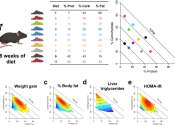Mouse study shows how a father's diet can shape the health of his offspring
A study of mice suggests a father's diet may shape the anxiety of his sons and the metabolic health of his daughters before they are even conceived.
Apr 17, 2024
0
50
A study of mice suggests a father's diet may shape the anxiety of his sons and the metabolic health of his daughters before they are even conceived.
Apr 17, 2024
0
50

Researchers from Children's Hospital of Philadelphia (CHOP) found that teens and young adults with mood disorders, such as depression and bipolar disorder, were 30% less likely to obtain their driver's license than peers ...
Apr 8, 2024
0
35

Lack of respectful maternity care in the U.S. culminating in mistreatment in childbirth is a regular occurrence, according to a new study at Columbia University Mailman School of Public Health. Yet until now experiences of ...
Apr 4, 2024
0
34

A large multi-state electronic health record-based study from the Centers for Disease Control and Prevention's (CDC's) VISION Network has found that COVID-19 vaccines are as effective for adults with anxiety, depression, ...
Apr 3, 2024
0
4

For years, scientists have expressed concern about potential adverse health effects of excessive exposure to short wavelength light (SWL), which includes the "blue light" from smartphones, laptops, and tablets. However, the ...
Mar 4, 2024
1
5

For children and teens, irregular meals such as skipped breakfasts are linked to an increased risk of frequent headaches, according to a new study published in Neurology. The study also found that for those ages 12 to 17, ...
Feb 28, 2024
0
0

Auricular acupuncture, recommended by the World Health Organization (WHO) and offered as an integrative practice since 2006 by the SUS (Sistema Única de Saúde), Brazil's national health service, is safe for patients with ...
Feb 27, 2024
0
144

Problems with our sleep and internal body clock can trigger or worsen a range of psychiatric disorders, according to a new review of recent research evidence.
Feb 19, 2024
0
77

A team of researchers led by Indiana University School of Medicine faculty have developed a breakthrough new blood test for schizophrenia, a psychiatric disorder that includes hallucinations and delusions.
Feb 8, 2024
0
64

Medicinal psilocybin may prove to be an untapped therapeutic resource for a variety of psychiatric conditions identified by researchers at The Florey Institute of Neuroscience and Mental Health.
Dec 15, 2023
0
1

Mood disorder is the term designating a group of diagnoses in the Diagnostic and Statistical Manual of Mental Disorders (DSM IV TR) classification system where a disturbance in the person's mood is hypothesized to be the main underlying feature. The classification is known as mood (affective) disorders in ICD 10.
English psychiatrist Henry Maudsley proposed an overarching category of affective disorder. The term was then replaced by mood disorder, as the latter term refers to the underlying or longitudinal emotional state, whereas the former refers to the external expression observed by others.
Two groups of mood disorders are broadly recognized; the division is based on whether the person has ever had a manic or hypomanic episode. Thus, there are depressive disorders, of which the best-known and most researched is major depressive disorder (MDD) commonly called clinical depression or major depression, and bipolar disorder (BD), formerly known as manic depression and characterized by intermittent episodes of mania or hypomania, usually interlaced with depressive episodes.
This text uses material from Wikipedia licensed under CC BY-SA